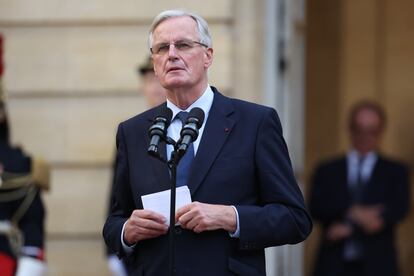At 6:02 p.m. on Thursday, Gabriel Attal, 35, the youngest prime minister of the Fifth Republic, climbed the steps of the Matignon Palace, accompanying the man who would become its new tenant, the oldest prime minister of the same period, who could well be his father: Michel Barnier, 73 years old. It was the end of a soap opera that has lasted 51 days, but also the failure of the attempt to transform French politics since Macron landed at the Elysée Palace in 2017. Barnier, a renowned negotiator, has been in politics for 51 years and belongs to the Republicans (LR) party, which was not even part of the republican front proposed by the head of state to confront the far right. But above all, the scene of Barnier taking over from Attal also represented a failure to stop the far right, even if that image was more blurred in the courtyard of Matignon.
Marine Le Pen, leader of the far-right National Rally (RN), was dealt a huge blow on July 7, when she discovered live, and in front of all of France, that all the polls had been wrong. Her party, far from winning the elections, came in third place behind the New Popular Front, the electoral artefact of the left, and the presidential bloc built around Emmanuel Macron. The left, for once, had managed to organise itself around the same banner, managing to contain the far right, which was taking a tremendous beating. The misfortune, the frozen half-smile, was transformed into optimism as the days went by and Macron was unable to propose a candidate (male or female) who would put a face to the victory of the progressive forces and, at the same time, leave out Jean-Luc Mélenchon’s La France Insoumise. All at once was impossible.
Teresa Suarez (EFE)
Le Pen, in the midst of her party’s institutional transformation, decided to remain silent and watch the spectacle. She didn’t have to do much to make her 126 deputies and 11 million votes count. If Macron failed to win the support of the left, sooner or later her phone would ring. And so it did. The far-right leader only had to give her thumbs down a couple of times to show that the dissolution of the National Assembly had been of no use, that the illusion of unity and the cordon sanitaire were useless and that her party would be decisive for the stability of the new government and, probably, also for the presidency of the Republic. Le Pen and her party had never had so much influence.
Everything is open, including the future of Macron himself, whose mandate officially expires in 2027. And it will depend, to a large extent, on the executive that Michel Barnier is able to put together in the coming days, including ministers of different sensibilities. The new head of government will find himself with a pile of backlogs, skyrocketing debt and a deficit (6.2% of gross domestic product in 2025 if urgent measures are not taken) typical of those countries that threatened to break up the euro zone just a few years ago. But also a street inflamed by left-wing forces, who on Saturday will demonstrate against the President of the Republic under the triple slogan: “Censorship, mobilization, dismissal.”
The third word – “dismissal” – threatens to become one of the refrains of the political song that the French will hear in the coming weeks if Barnier does not succeed. This is a detail that has not escaped the attention of the new prime minister, who, as soon as he set foot in Matignon, admitted that France is going through a “serious” moment and that a great deal of respect must be shown and shown for all political forces, in an obvious reference to Jean-Luc Mélenchon’s La France Insoumise, but above all to Marine Le Pen’s Région Nationale, in whose hands the survival of the future Executive now lies.
Knowing what’s happening outside means understanding what’s going to happen inside, so don’t miss anything.
KEEP READING

Barnier wanted to demonstrate his open-mindedness by recalling his mother and recalling one of the pieces of advice she always gave him: “When we are sectarian, it is because we are not sure of our ideas.” The new prime minister gave the impression of wanting to please the far right by expressly citing public safety and the “immigration issue” as priority issues for his government. He also spoke of “the discontent that is affecting French citizens: in the cities, but also in the villages.”
Barnier, who has become forever the person who saved the day in the Brexit negotiations, will have to use all the knowledge he acquired in that process to try to save the Matignon and Elysée parties. “There will be changes and ruptures,” he announced, anticipating his roadmap. And Le Pen, from the comfort of her 126 seats in the Assembly, will demand that this be so.
Follow all the international information at Facebook and Xor in our weekly newsletter.
#Marine #Pen #keys #French #government